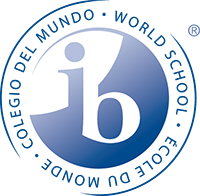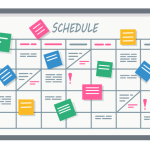Balancing demanding IB assignments, Internal Assessments, and Exams is no easy task, but DP2 student Anja Sprčić has mastered organization, effective studying, and discipline. As the ideal IB student, including a perfect score of 42 points in DP1 (not including points from ToK and the Extended Essay), Anja shares her valuable insight for preparing for mocks and staying on top of deadlines.
Background Information
Can you tell us a bit about yourself and your academic goals?
“I’m Anja, a DP senior at MIOC IB, and I would like to study medicine here, in Zagreb, at MEF.”
What motivates you to aim for such success?
“I’m very motivated to become a doctor, specifically a surgeon. I think that being a doctor brings you self-satisfaction that you cannot really get from any other job, because you help and heal people. So, I would say that that is my biggest motivation.”
How do you stay consistent and disciplined with your studies?
“Well, I mostly study because I know that I will need this knowledge in the future, so I am the most motivated to study for subjects such as chemistry and biology, as they will be crucial for me in the future. As for the rest of my subjects, I know that I need to get good grades in order to get into the university I am aiming for. Additionally, it just brings me joy to see good grades in my e-Dnevnik.”
Schedule and Organization
How do you organize your study schedule? Do you have a specific routine?
“So, at the end of the week, on Friday afternoons, I usually make a detailed plan of what I have to do over the weekend (as I study the most on the weekends, since I do not really have time over the week). Then, at the end of the weekend, I make a one or two week plan with all of the assignments and due dates that I have during that time, just so that I approximately know what I have to do in the next two weeks, and, lastly, I make a schedule based on that.”
How do you manage deadlines for IAs while also preparing for mocks and finals?
“Alright, I have some advice here. So, my advice is to do your IAs in third grade or over the summer, especially maths and economics. As for the sciences, try and do them in the first semester of DP2, as you will definitely not have enough time in the second semester. This way, when the time comes for preparing for mocks and finals, you won’t have all of your IAs to do as well.”
Do you use any specific apps, planners, or platforms to stay organized?
“I used the app ‘Notion‘ in DP1, which was very good for planning, so I recommend that. However, I am a perfectionist, so I wanted something more aesthetically pleasing. Over winter break, I had a ton of work, and I realised that I wouldn’t be able to actually do it all in a week if I didn’t plan accordingly. So, I went onto “Google Calendar” where I literally planned my days down to the hour. Surprisingly, I managed to actually stick to it, and complete everything I had planned for that week.”
Study Techniques
Could you tell us what your go-to study methods are?
“Honestly, I don’t really have anything in particular. Maybe, sometimes, the Pomodoro technique, even though I do find it too restrictive, because sometimes I feel like studying for more than half an hour, and sometimes less. When you find the motivation to study more, don’t stop! A method I actually really do like is active recall (it is related to cognitive psychology), and it actually works. This technique is especially helpful for mocks. When you study for a regular exam, make flashcards or take notes (I use ‘Brainscape‘ for this), and then when mocks come around, you can just go back to those notes and review them. This helped me a lot, especially for my biology mock.”
How do you study for specific subjects (ex: how you approach math vs. English or economics)?
“I know that it can be hard to always pay 100% attention during class, but I think that it is really important. For example, for English, it helped so much, both for mocks and for orals (because in orals you analyze an excerpt from a book or short story that you work on in class with your teacher). Additionally, most topics that you will discuss in your oral, you will go through with your teacher, so listen and take notes! When it comes to math, I go through every practice sheet given by the teacher, and sometimes also the study guide. For the sciences, I make flashcards. I think that that is the most effective way to study sciences, as you get to actually test yourself and recall your knowledge.”
Preparing for Mocks and Finals
How do you prepare yourself for mocks?
“I mostly stick to what I mentioned above. I revise through all my content, and I go through my flashcards. For economics, I went through the entire textbook, and made a study sheet, which was very useful. I also solve various practice questions, as well as past paper questions (for most subjects).”
Do you have a routine for reviewing past papers or mocks in order to improve for the finals?
“I focus more on the actual content. Then, when I get my mocks back, I will analyze my test and see what needs to be improved the most, and focus on that. But, yes, I do go through past papers as well.”
What would you say is the biggest mistake that students make when studying for mocks or finals?
“As mentioned, I would say that one of the biggest mistakes students make is not actively listening during class, which could really help you out. Secondly, also as mentioned, doing the IAs late. So, seriously do the IAs that you can over summer, you don’t need to be dealing with them last minute, right before your mocks. Overall, I would say that the biggest mistake is just starting too late.”
Advice for Others
What advice would you give other DP students currently preparing for mocks or finals?
“Do the active recall method in DP1, as it will be very difficult to fit all that in before your mocks. Then, do your IAs as early as you can (preferably over the summer). Next, listen throughout the year, pay attention in class. Keep in mind that your learning has to be continuous, you can’t cram it all in at once. And lastly, just be organized!”
If you could go back and give yourself any advice in DP1, what would it be?
“Basically, everything above! It would’ve been extremely helpful to have known all that back then.”
Success in the IB isn’t just about abilities, it’s about planning, consistency, and finding the right and most effective study technique for you. Anja’s journey is proof that starting on time, paying attention in class, and staying organized can make all the difference. Whether you’re in DP1 or a DP2 student preparing for finals, her advice serves as a clear path to achieving success.




